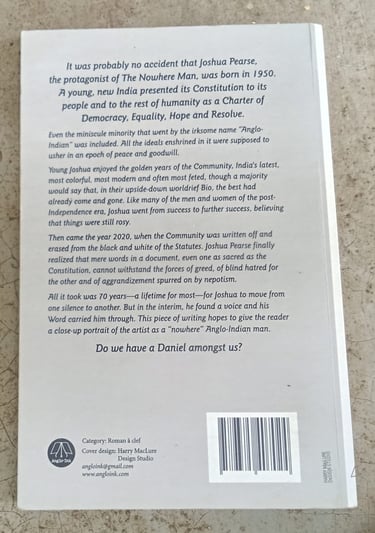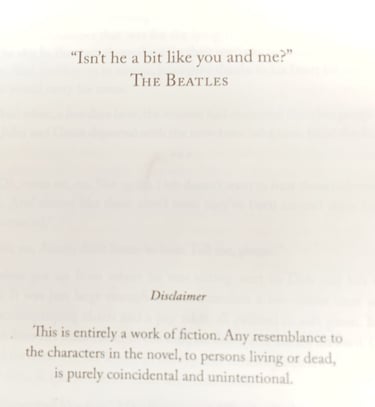The Beginning of the End
My fourth publication
1/8/20254 min read
My novel, The Nowhere Man, like all my other books, has had modest success. I’m sure that this is so because the book has not reached the target audience I had in mind—my own people! However, making excuses will not set things right, even though the publishing glitch was my fault. The book was published by Amazon, but it was made available—initially—only in the US and Great Britain, whereas I expected it to come out and to succeed in India. The cost of the volume was moderate enough, but shipping costs were actually three time the book’s face value. I gather that it is now available as an e-book for a throwaway price.


I was asked, by an International Journal, how long it took me to write the book. The answer that I provided—that it took me a life-time—evoked some interest, especially from potential film agents ever on the look-out for new, raw material, but so far nothing has borne fruit. My only consolation is that my readers—I do have some, by the way—have shown appreciation; but, more than this, when I re-read my work, I still find it pleasurable, informative, and very down-to earth. I believe all my books open up on the “Anglo-Indian” way of life, the only one I know and live and experience every day, and one that is sadly passing away right before our very eyes. This may seem like nostalgic rambling to many, but the really lived experience is unique, it is worthy of documentation—warts and all—and it is worth preserving for posterity. A long time ago I gave the clarion call: “We will not go gently into that good night”; no one listened then and no one still does.
Any writer who takes the Word seriously does not work randomly, or without purpose. I value my words and that is why I chose the title The Nowhere Man for what I consider my best work to date. I acknowledge the influence of The Beatles and try to win over the reader by signalling similarities. Words reverberate with meaning and the context provided by the writer multiplies the impact each word has on its neighbour, leading to a crescendo thought and idea and implication, until the sequence takes on a mystical, mesmerizing, magical synthesis, a wholeness that can be exhilarating for the careful reader, not for the usual, casual, happy-go-lucky one.
Having made that observation, I must say I agree with the truth that it is the reader who has to come up to the level of the book, not the other way round. Books are complex things, and any book worth its salt must seek to engage the reader in a profitable discourse. Today most noteworthy books have annotated editions, not really of the cheap bazaar variety that is the Indian student’s last recourse. Believe me, most good books lead the reader to discover and explore their multiple layers of reality and the more the reader travels down this path, the more he will be rewarded with the ultimate pleasure of cracking the code of the book and understanding what exactly makes it tick.


Allow me’ dear Reader, to give you a minor guided tour. When you go through the first page of my The Nowhere Man, you will realize that the initial tone is Biblical. The exact date on which the protagonist was born is indicative—or at least, it should be—that there is a hint of something more than Biblical. The sixth of June, 1950, adds up to the number 666, which is synonymous with the Beast. The birth is not dominated by a single, dominant star, since the sky glows with resplendent beauty. Soon the reader discovers that the protagonist’s name is Joshua—the man who led the Israelites into the promised land. There is a further twist when the reader realizes that Joshua’s surname is Pearse—identical in sound to the word “pierce”—which, as the reader progresses into the narrative, he discovers that the protagonist is indeed “pierced” to the quick many a time in his eventful life. The most ordinary activities take on added meaning, as everyday occurrences are looked at through a very convex, complex lens.
At the end of it all, Joshua realizes that the nonchalant apathy that envelops his world is never going to change and like a famous satirist of old, he retires, worn, wan, and wasted, to raise pigs—he finally gains insight that rearing real pigs may be far more profitable that throwing pearls before swine. With an identity that is erased by the powers that be in his country, Joshua feels like the prophet of old—simply a “voice crying in the wilderness” of modern life. And still the world keeps turning.
I think I’ll close here, but before I do, I wish you, dear Reader, to at least “talk to the Hand”, a piece of art I created out of nothing—a broken, discarded piece of a tree that once bore extremely delicious fruit.


Of late, I’ve begun to wonder if my words will have any effect. Do you think that Joshua Pierce (aka Bryan Peppin) is prophetic, or is he one of the many false prophets that come along fairly frequently in our time and age? Is he, perhaps a deep fake, someone to be cast out into utter darkness, there to be witness to the weeping and gnashing of teeth?
As the poet remonstrated (to his Maker): “O thou Lord of life/Send my roots rain”.
